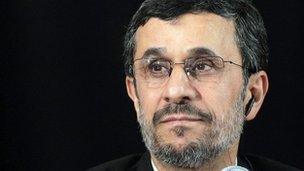Iran's parliament to reconsider subsidy reform
- Published

There seems to be an orchestrated campaign against the president by his opponents, analysts say
Iran's parliament has voted to consider suspending plans for further reform of the country's food and fuel subsidies.
The move follows street protests by traders over the steep slide in the value of Iran's currency, the rial, against the US dollar.
Many Iranians blame the problem on President Mahmoud Ahmadinejad's policies, increasing public pressure on him to step down, analysts say.
Iranian officials blame speculators and international sanctions for the crisis.
US officials say the slide reflects the success of US economic sanctions targeted at Iran's controversial nuclear programme.
'Orchestrated campaign'
There was no date given for when parliament would make a decision on whether or not to stop the second phase of subsidy reforms.
The first phase, which was introduced in late 2010, was hailed by President Ahmadinejad at the time as the biggest economic reform in decades, so parliament's vote is being seen as a political blow to the president at a time when he is facing growing public discontent over the rial's slide.
On Wednesday, merchants in Tehran's Grand Bazaar took to the streets. Traders are angry at the lack of direction from the government in the crisis, which they say has led to more instability in prices and made trading almost impossible, analysts say.
Riot police used tear gas to disperse the demonstrators, who had gathered outside the central bank, calling for the governor to stand down, and chanting anti-government slogans.
BBC Persian's Kasra Naji says opponents of the president are coming out against him in what looks like an orchestrated campaign, and members of parliament are also stepping up the pressure.
They have called in the governor of the central bank for questioning. One MP has said Mr Ahmadinejad must not stay in power a day longer.
During Friday prayers, imams throughout Iran spoke as if reading from the same script, saying the president could not blame others for the impotence of his government, and that the people would not be fooled any more, our correspondent says.
Iran's Supreme Leader Ayatollah Ali Khamenei, once a staunch supporter of President Ahmadinejad, has kept quiet so far, our correspondent adds.
- Published6 October 2012
- Published3 October 2012
- Published2 October 2012
- Published1 October 2012
- Published30 March 2015
- Published30 September 2012